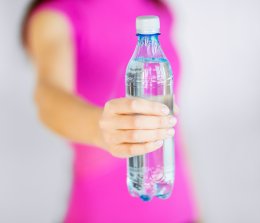(=_=)
2015-01-13 22:04:09 UTC
Just look at the list of products that we're being told to avoid because of
this chemical in plastic products.
Are we kidding here? MOST of the products on the shelves in food stores use
these types of containers.
'Stop using toilet paper and tissue paper'? Give me a break . . . we've got
too much shit happening in this country to ever think about that option seriously.
It's time our "tough on crime" government got tough on the MANUFACTURERS of
these products and made THEM remove the unsafe compounds.
But that would mean the Harper government would have to put pressure on
'corporations' - his best buddies and protected election donors, wouldn't it?
Get rid of the man and his incompetent and reluctant government, and become
safer Canadian consumers.
___________________________________________
January 13, 2015 - http://www.washingtonpost.com
How to avoid products with toxic bisphenol-s
Studies of bisphenol-S, the chemical compound sometimes used to replace
bisphenol-A in "BPA-free" plastic products, found it is disruptive not only to
the body's hormone system, but to brain circuitry in developing animal embryos.
Known to mimic estrogen, BPA and BPS are not the only synthetic chemicals found
in hard plastic and certain resins that do so. (Close relatives include
Bisphenol B, C, E, F, G, M. P, PH, TMC and Z.) In laboratory tests, 95 percent
of hundreds of ordinary plastic products put through "real world" conditions,
such as through a microwave or dishwasher, tested positive for leaching
estrogenic chemicals.
Since companies are under no obligation to tell consumers what chemicals are
used in the manufacture of their product, many health experts say the best
thing to do is avoid
^^^^^^^^^^^^^^^^^^^^^^^^^^^^^^^^^^^^^^^^^^^^^^^^^^^^^^^^^^^^^^^^^^^^^^^^^^^^^^^^^^^^^^^^^^^^^^^^^^
contact with household plastics altogether.
With the caveat that it is nearly impossible to not be exposed to plastic in
the course of a day, here are two lists.
The first contains a selective list of plastic items or products that contain
plastic resins that experts say you should limit your exposure to or sanitize
your hands after touching.
The second list contains a selective list of safe alternatives
AVOID:
- hard plastic sports bottles
- plastic food storage containers
- food wrap
- hard and flexible packaging
- deli containers
- plastic bags
- baby bottle components (nipple, ring, liner, etc)
- plastic dinnerware and plates
- non-stick cookware
- plastic cleaning products
- thermal receipt paper
- canned food and drink
- tissue paper and toilet paper <<====== !
ALTERNATIVES:
- stainless steel water bottles
- ceramic plates and dishes
- unbleached wax paper
- anything made from wool, cotton, hemp or plastic-free, biodegradable fibers
- plastic-free cleaning products, such as baking soda, vinegar and essential oils
- stainless steel or cast iron cookware
- glass blender
- wire salad spinner
- stainless steel ice-cube tray
- natural rubber gloves
- recycled, individually-wrapped toilet paper
- bar soap
- handkerchief
Loading Image... &w=1484
&w=1484
==================================================================
It is horrifying that we have to fight our own government to save the environment
~ Ansel Adams
==================================================================
this chemical in plastic products.
Are we kidding here? MOST of the products on the shelves in food stores use
these types of containers.
'Stop using toilet paper and tissue paper'? Give me a break . . . we've got
too much shit happening in this country to ever think about that option seriously.
It's time our "tough on crime" government got tough on the MANUFACTURERS of
these products and made THEM remove the unsafe compounds.
But that would mean the Harper government would have to put pressure on
'corporations' - his best buddies and protected election donors, wouldn't it?
Get rid of the man and his incompetent and reluctant government, and become
safer Canadian consumers.
___________________________________________
January 13, 2015 - http://www.washingtonpost.com
How to avoid products with toxic bisphenol-s
Studies of bisphenol-S, the chemical compound sometimes used to replace
bisphenol-A in "BPA-free" plastic products, found it is disruptive not only to
the body's hormone system, but to brain circuitry in developing animal embryos.
Known to mimic estrogen, BPA and BPS are not the only synthetic chemicals found
in hard plastic and certain resins that do so. (Close relatives include
Bisphenol B, C, E, F, G, M. P, PH, TMC and Z.) In laboratory tests, 95 percent
of hundreds of ordinary plastic products put through "real world" conditions,
such as through a microwave or dishwasher, tested positive for leaching
estrogenic chemicals.
Since companies are under no obligation to tell consumers what chemicals are
used in the manufacture of their product, many health experts say the best
thing to do is avoid
^^^^^^^^^^^^^^^^^^^^^^^^^^^^^^^^^^^^^^^^^^^^^^^^^^^^^^^^^^^^^^^^^^^^^^^^^^^^^^^^^^^^^^^^^^^^^^^^^^
contact with household plastics altogether.
With the caveat that it is nearly impossible to not be exposed to plastic in
the course of a day, here are two lists.
The first contains a selective list of plastic items or products that contain
plastic resins that experts say you should limit your exposure to or sanitize
your hands after touching.
The second list contains a selective list of safe alternatives
AVOID:
- hard plastic sports bottles
- plastic food storage containers
- food wrap
- hard and flexible packaging
- deli containers
- plastic bags
- baby bottle components (nipple, ring, liner, etc)
- plastic dinnerware and plates
- non-stick cookware
- plastic cleaning products
- thermal receipt paper
- canned food and drink
- tissue paper and toilet paper <<====== !
ALTERNATIVES:
- stainless steel water bottles
- ceramic plates and dishes
- unbleached wax paper
- anything made from wool, cotton, hemp or plastic-free, biodegradable fibers
- plastic-free cleaning products, such as baking soda, vinegar and essential oils
- stainless steel or cast iron cookware
- glass blender
- wire salad spinner
- stainless steel ice-cube tray
- natural rubber gloves
- recycled, individually-wrapped toilet paper
- bar soap
- handkerchief
Loading Image...
==================================================================
It is horrifying that we have to fight our own government to save the environment
~ Ansel Adams
==================================================================